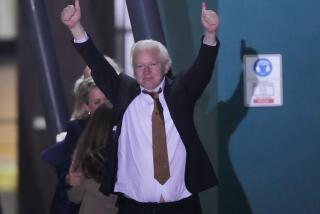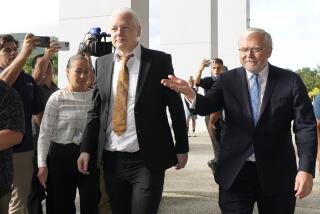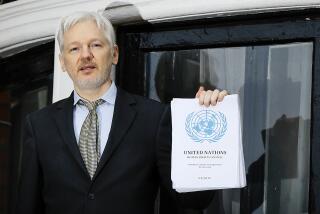Julian Assange put informants’ lives at risk, U.S. says in extradition hearing
- Share via
LONDON — An investigative journalist defending himself against a U.S. president hostile to the press, or a criminal who put the lives of secret sources at risk by hacking computers and releasing classified documents.
Those were the two competing narratives laid out before the judge in London’s Woolwich Crown Court on Monday as the first day of WikiLeaks founder Julian Assange’s extradition hearing got underway.
“President Trump came into power with a new approach to freedom of speech and with a new hostility to the press — amounting effectively to declaring war on investigative journalists,” Assange’s lawyer, Edward Fitzgerald, told Judge Vanessa Baraitser. “President Trump and his administration then decided to make an example of Julian Assange. He was the obvious symbol of all that Trump condemned.... He brought American war crimes to the world.”
Earlier in the day, lawyers acting for the U.S. government told a different story, saying Assange was guilty of “pure criminality” and cannot hide behind the guise of journalist.
Opening the hearing, which is expected to last a week, lawyer James Lewis said the case against Assange, 48, had nothing to do with him disclosing “embarrassing or awkward information the government would rather not be disclosed.”
Instead, this was about his actions — hacking into a U.S. Department of Justice computer system with U.S. Army intelligence analyst Chelsea Manning and knowingly putting people at risk of torture and death by releasing thousands of classified documents that revealed the identities of sources helping the U.S. and its allies during the wars in Afghanistan and Iraq.
“This is an ordinary criminal charge,” Lewis told Baraitser. “Journalism is not an excuse for criminality or a license to break ordinary criminal laws. This is true in the U.K. as it is in the U.S.A., and indeed in any civilized country in the world.”
With the sound of hundreds of supporters chanting in the street outside and his father, John Shipton, looking down from the public gallery, Assange entered the courtroom shortly after 10 a.m. He wore a white shirt, gray sweater and gray suit jacket.
His white hair was neatly cropped, and he spoke only to confirm his name and date of birth.
Flanked by two prison officers — his black rimmed glasses propped on top of his head — Assange sat passively, looking over documents he held in his lap as lawyers presented their case against him. But before adjourning for lunch, he rose to address the judge.
“I’m having difficulty concentrating; this noise is not helpful either,” he said. “I’m very appreciative of the public support and do understand they must be disgusted by these proceedings.”
The judge stopped him, explaining it was very unusual for a defendant to address the court directly.
“I’m going to ask you to speak to your lawyer,” Baraitser said. “I generally don’t hear from people in this kind of context.”
Assange’s lawyer said that Assange could not hear or concentrate because of the ongoing din from protesters outside.
They were holding aloft banners that read “Free Assange” and “Jail the war criminals,” blowing horns and chanting. Protesters had set up tents near the entrance to the court, and some wore masks of Assange’s face.
“We will certainly try to sort it,” Fitzgerald said.
Lawyers for the U.S. government are seeking Assange’s extradition to the United States, where he faces 18 charges. His lawyers maintain that if he’s brought to the U.S. and eventually convicted, he could face up to 175 years in prison.
On Monday, Lewis dismissed that as “hyperbole,” saying sentencing would be determined solely by the U.S. trial court and this should not be used as a reason not to extradite.
In presenting the U.S. government’s case against Assange, Lewis said the defense would seek to “paint him in glowing colors of liberty” and defend his actions as free speech. But this was not about “what good or bad deeds he has done in the past” but his specific criminal actions related to the release of hundreds of thousands of top-secret U.S. diplomatic cables and documents in 2010 and 2011.
Meanwhile, Assange’s lawyers described their client as a man whose “positive impact on the world is undeniable” but who also suffers from clinical depression and is at high risk of suicide should his extradition go ahead and he is separated from family and friends in Britain.
“The very thought of extradition to the U.S. fills him with overwhelming dread,” Fitzgerald said. “Dread that he won’t be able to defend himself, that he won’t be given a fair trial … [that he will become a victim] in a politically motivated trial.” It would amount to cruel and inhuman treatment, the lawyer said.
Fitzgerald laid out some of the witnesses his team intends to call when the second stage of the extradition hearing takes place in May. They include a former employee of a Spanish security company who says that Assange’s communications were tapped while he lived in London’s Ecuadorean Embassy. The anonymous witness will testify that at one stage, conversations even turned to whether Assange could be kidnapped or poisoned, Fitzgerald said.
Assange’s lawyer said the fact that so much time had lapsed between the leak of diplomatic cables in 2010 and the extradition request in 2019 was further evidence that this was not about justice but the “manipulation of the system” to make an example of Assange.
He also described how former Congressman Dana Rohrabacher and Charles Johnson, a close associate of Trump, visited Assange in the embassy to offer him a pardon if he identified the source — and denied Russian involvement — in the release of Democratic National Committee emails in the 2016 presidential election.
He said that Trump was “aware of and approved” their visit, claims that the White House and Rohrabacher denied.
“President Trump denies everything. But we say: ‘Well he would, wouldn’t he?’” Fitzgerald said.
Laying out the prosecution’s case, Lewis described how Assange, via his WikiLeaks website, published a wish list of “Most Wanted Leaks” and worked with Manning to crack the password on the Defense Department computers so they could gain access and publish secret, classified material.
The indictment against Assange describes it as “the largest compromise of classified information in the history of the United States.”
The names of human rights activists, journalists, religious leaders and dissidents were left unredacted in some of the material, which, the prosecution argues, put them and their families at serious risk of being harmed by the oppressive governments they lived under.
Lewis said Assange himself had in the past dismissed the risk to these individuals as “regrettable.”
“What is alleged is far more than regrettable,” Lewis said, “it is criminal.”
Manning was convicted by court-martial under the Espionage Act and spent several years behind bars, but Assange has never faced trial.
Assange is being held in Belmarsh prison, in southeast London, where he has been serving a 50-week sentence for bail violations since being forcibly removed by British police from Ecuador’s embassy in April.
He spent seven years inside the embassy, in London’s posh Knightsbridge neighborhood, after Ecuador’s then-president, Rafael Correa, granted him political asylum in 2012.
He was facing sexual assault allegations in Sweden at the time, which he consistently denied. The charges were eventually dropped.
The extradition hearing will not focus on wrongdoing but instead determine whether Assange can be extradited under the terms of a U.S.-U.K. treaty.
But 1st Amendment advocates warn that any trial on his indictment under the U.S. Espionage Act could set a precedent for far-reaching restrictions on press freedoms.
The extradition hearing will continue for a week and then be placed on hold until May 18 so both sides can gather more evidence before a further three-week hearing.
Boyle is a special correspondent.
More to Read
Sign up for Essential California
The most important California stories and recommendations in your inbox every morning.
You may occasionally receive promotional content from the Los Angeles Times.










